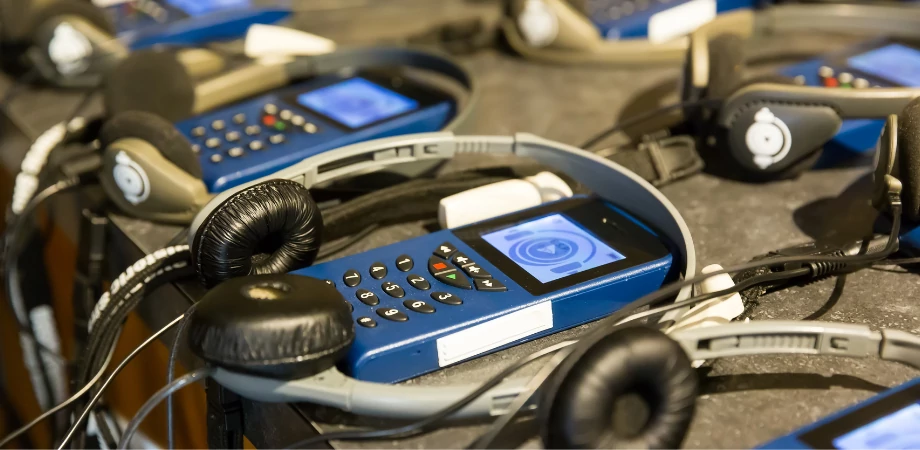In an era where communication knows no borders, instant language interpretation has risen as an essential tool for overcoming linguistic hurdles. Businesses and individuals alike seek telephonic interpreter services that provide immediate, reliable, and accurate translation to facilitate clear conversations. As a cornerstone for global interactions, such services offer a breadth of multilingual communication solutions tailored to meet the ever-increasing and diverse demands of an interconnected world.
The Rise of On Demand Phone Interpreting in a Globalized World
In the landscape of modern global interactions, on demand phone interpreting services has manifested as a key player, accelerating the pace at which businesses and individuals engage across borders. As the world economy hinges more than ever on international collaboration, instantaneous translation services have scaled to prominence, supporting clear and effective global communication. In this technologically driven ecosystem, the agility provided by on demand interpreting is not just a convenience but a logistical necessity.
Breaking Down Language Barriers in Real Time
The ability to communicate without the hindrance of language barriers marks a milestone in the realm of international business, diplomacy, and social services. Language service providers are at the forefront of this revolution, offering real-time interpreting solutions that bridge linguistic gaps instantly. Such immediate translation and interpretation services translate into stronger partnerships, smoother negotiations, and wider outreach for organizations. Below, a comparison between traditional and on demand interpreting service providers outlines the transformation of the industry.
For industries operating on a multinational level, these advancements in language service providers are not just about efficient communication; they’re key to maintaining operational continuity and cultural understanding. Anecdotal evidence from international corporations demonstrates how seamless integration of phone interpreting services has led to improved negotiation outcomes, enhanced customer relations, and even played a role in life-saving medical consultations.
Advantages of On Demand Phone Interpreting Over Traditional Methods
On demand phone interpreting serves as a pivotal development in translation services, offering vast improvements over traditional methods. By leveraging cutting-edge technology, these services are reshaping the landscape of professional interpretation. They are ensuring that immediate interpretation is not just a possibility but a practical reality, addressing the dynamic needs of global communication.
Accessibility and Convenience
The cornerstone of on demand phone interpreting is its unparalleled accessibility and convenience. Users can connect with an interpreter almost instantaneously, from any location, using just their phone. This eliminates the need for pre-scheduled appointments or physical presence, allowing for spontaneous multilingual conversations anytime, anywhere. For those who require quick language access compliance, such as public officials or emergency responders, this method is invaluable.
Time-Efficiency and Cost-Effectiveness
Traditional face-to-face interpretation often involves logistical planning, travel time, and potential delays. On demand phone interpreting, however, is a model of time-efficiency, instantly connecting users to interpreters without the wait. This streamlined process translates to significant cost savings for both individuals and businesses. It eliminates the travel expenses and hourly rates associated with in-person services, offering a more economical and efficient alternative.
Ensuring Confidentiality and Compliance
Privacy in interpretation is a critical concern, particularly in fields like healthcare, legal, and government sectors. On demand phone interpreting services provide secure lines and adhere to strict confidentiality agreements, ensuring sensitive information remains protected. Additionally, by complying with language access laws and industry-specific regulations, these services help organizations maintain compliance while facilitating communication in multiple languages.

On Demand Phone Interpreting for Healthcare: A Critical Tool for Patient Care
The integration of medical interpreting services into the healthcare sector has become indispensable. Providing linguistic assistance in healthcare is not only a matter of legal compliance but also an ethical responsibility to ensure that patient-provider communication is clear, accurate, and equitable. On demand phone interpreting serves as a bridge between healthcare professionals and patients who may face language barriers, cultivating a supportive and understanding environment critical for effective treatment and patient satisfaction.
Healthcare providers are increasingly recognizing the influence of profound and precise communication on patient outcomes. When language barriers exist, they can lead to misunderstandings, misdiagnoses, and inappropriate treatment plans. In such scenarios, on demand phone interpreting delivers immediate access to professional interpreters well-versed in medical terminology, thus enhancing the quality of patient-provider communication and patient care.
- Enhances patient comprehension: Ensuring patients fully understand their diagnosis, treatment options, and care instructions.
- Improves patient comfort and trust: Allowing patients to communicate in their native language helps in establishing rapport with healthcare providers.
- Reduces the risk of medical errors: Precise interpretations can be crucial in administering the correct treatments and medications.
- Ensures informed consent: Patients can make better healthcare decisions when they clearly understand the information provided.
As the healthcare system evolves, so does the intricate role of linguistic assistance. The demand for medical interpreting services has escalated, pushing the industry towards innovative solutions like on demand phone interpreting. These advancements optimize the patient experience by supporting seamless and proficient communication, ultimately fostering a healthcare environment where the patient’s voice is never lost in translation.
Integrating On Demand Phone Interpreting into Customer Service Strategies
Ensuring customer service excellence in today’s global market necessitates a comprehensive strategy that includes enhancing customer relations through multilingual support. The deployment of on demand phone interpreting services is a pivotal step in creating an inclusive environment that caters to a diverse customer base. This not only fosters trust among non-English speaking customers but also sets a standard for exceptional customer service by providing real-time communication solutions.
Building Trust with Non-English Speaking Customers
Trust is the cornerstone of any lasting customer relationship. Integrating on demand phone interpreting into customer service allows businesses to communicate effectively with clients in their preferred language. This gesture of accommodation speaks volumes, demonstrating respect for the customer’s cultural background and a commitment to understanding their needs. Such a proactive approach in facilitating multilingual interactions can dramatically enhance the customer’s perception of a brand’s reliability and sensitivity.
Real-Time Support for Improved Customer Experiences
Offering immediate linguistic support via on demand phone interpreting services substantially elevates customer experiences. The ability to address issues, answer queries, and provide assistance in real time, without language being a barrier, is instrumental in achieving customer service excellence. By ensuring that communication is clear, businesses can better understand and meet customer expectations, leading to increased satisfaction and loyalty.
Training and Resources for Customer Service Teams
To adeptly handle the complexities of multilingual customer encounters, customer service teams require appropriate training and resources. Knowledge of how to seamlessly integrate phone interpreting services into daily interactions is critical for smooth operation. Comprehensive training programs must cover not only the technicalities of using interpreting services but also cultural sensitivity and communication skills that empower representatives to deliver superior support irrespective of language differences.

The Role of Technology in Enhancing Phone Interpreting Services
To comprehend the strides taken in phone interpreting services, one must look to the innovative interpretation solutions being employed today, including the integration of localization services. Advances in language technology are not merely incremental; they represent revolutionary changes that redefine the very essence of multilingual communication. From speech recognition to automatic dialect adjustment, interpreting software is making profound headways, incorporating localization services to ensure cultural and contextual appropriateness in translations. These advancements heighten the speed at which interpretation occurs, and fortify the accuracy of translations, ensuring that language is no longer a barrier but rather a conduit for clearer understanding.
The robustness of such technology lies not only in its capacity to support real-time interpretation but also in its versatility. Language technology advancements have allowed services to expand their offerings, catering to a broad spectrum of industries including legal, medical, and customer service sectors. Tailored solutions are the result of extensive research and innovation, and users experience a seamless transition between languages, fostering an environment where communication is unhindered by linguistic restraints. Providers that embrace these state-of-the-art interpreting software platforms are able to deliver unparalleled service that meets the exacting demands of our global economy.
A glimpse into the practical applications of these technologies reveals their transformative impact. For instance, hospitals utilizing these enhanced phone interpreting services can offer non-English-speaking patients clear explanations of medical procedures, thus improving the quality of care. Multinational corporations, through integrated interpreting software, can facilitate effortless cross-border transactions and negotiations. In effect, these language solutions not only refine the functionality of phone interpreting services but also enrich the experiences of all parties involved, forging stronger, more effective international and community relationships.



